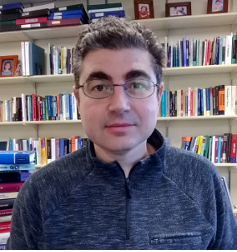Faculty

Principal Investigator
Susan E. Brennan, Professor of Cognitive Science
Department of Psychology
Affiliated, Departments of Computer Science and Linguistics
Email: susan.brennan@stonybrook.edu
Website: http://www.psychology.sunysb.edu/sbrennan-/
Susan Brennan is Professor of Cognitive Science in the Department of Psychology at Stony Brook University, with affiliations in Computer Science and Linguistics. Her research for the past 35 years has focused on psycholinguistics, verbal and nonverbal communication, audience design in writing and speaking, and the human use of technology. Earlier in her career, she conducted research at Atari, Apple, and Hewlett Packard Labs on topics including computer-generated caricature, mediated communication, and natural language and speech interfaces to computers. Current interests include human-AI interaction, the impacts of AI and bias on stakeholders, and whether/how an automated agent could learn to be a capable dialogue partner. See this presentation, at AAAS '21 (Annual Meeting of the American Association for the Advancement of Science), "Conversational Challenges of AI Teaming with Humans," (starts 1:15 in) and this keynote address from CUI '19 (Conversational User Interfaces, Dublin, Ireland), "Can Machines Learn to Converse? What We Know from >30 Years of 'Conversational Interfaces'." From 2015-2018 she served as Program Director at the National Science Foundation for the Graduate Research Fellowship Program.

Co-PI
C.R. Ramakrishnan, Professor
Department of Computer Science
Email: cram@cs.stonybrook.edu
Website: https://www3.cs.stonybrook.edu/~cram/
Professor Ramakrishnan’s current research interests are knowledge representation and quantum computation. In knowledge representation, he works on systems that combine statistical and logical knowledge: ways to represent such knowledge, perform inference and learning over such knowledge, and design probes to maximize their information content. An application of such a combined statistical/logical system is the verification of probabilistic concurrent systems. In quantum computation his recent work is broadly in building and using quantum networks: techniques for efficiently sharing quantum information across a network, and for distributing computation over a network of quantum computers. He currently serves as the Graduate Program Director of Computer Science.

Co-PI
Wei Zhu, Professor
Department of Applied Mathematics and Statistics
Email: wei.zhu@stonybrook.edu
Website: http://www.ams.sunysb.edu/~zhu/index.html
Professor Wei Zhu is a statistician and data scientist whose diverse research projects include the development and application of novel methods for (1) longitudinal and contemporaneous pathway discovery and analysis (for biological pathways, climate models and financial networks); (2) detection and classification of financial bubbles and crashes; (3) errors in variable regression (for situations when both the dependent and the independent variables suffer from random errors, which are indeed prevalent in real life and research); and (4) machine learning methods (for practical scenarios such as when the training sets are unbalanced). It is well known that each real world problem and dataset can often be modeled and analyzed in different ways – the key is to find the best way to obtain as valid and unbiased inference as possible. In parallel to this pursuit of methodology development, we also aim to help answer important questions to science and society. The following link features one of our latest research papers where we studied climate warming, sea level rising and their impact from a data science perspective: https://doi.org/10.3390/stats5010002. Another recent research paper can be found here. In this paper we use a reinforcement-learning framework, a frontier topic in data science and machine learning, to tackle the problem of vehicle mobility optimization.

Co-PI
Jeffrey Heinz, Professor
Department of Linguistics
Email: jeffrey.heinz@stonybrook.edu
Website: http://jeffreyheinz.net/
Jeffrey Heinz is a Professor of Linguistics at Stony Brook University, with a joint appointment in its Department of Linguistics and Institute of Advanced Computational Science. While he has conducted research in several related areas including computational and mathematical linguistics, computational learning theory, grammatical inference, theoretical computer science, and artificial intelligence, a primary focus is how humans come to know linguistic generalizations on the basis of their linguistic experience. In particular, he aims to identify biases that humans unconsciously bring to bear on language-learning. The kinds of biases he studies often regard the question "What does it mean for a pattern to be simple?" and he studies this question with respect to sequences and other recursive data structures. He has helped identify several subregular classes of formal languages which (1) instantiate different kinds of simplicity biases, (2) have logical and algebraic interpretations, (3) facilitate learning from examples, and (4) help explain why linguistic patterns are what they are. A recent article exemplifying this research can be found here: https://doi.org/10.15398/jlm.v9i1.262

Co-PI
Bonita London, Professor
Department of Psychology
Email: bonita.london@stonybrook.edu
Website: https://you.stonybrook.edu/identitylab/
Dr. London’s research aims to identify and explore the psychosocial and institutional mechanisms associated with social identity threat, and the consequences of threat for academic achievement and psychosocial well-being of historically marginalized groups (on the basis of gender, race, ideology and sexual orientation). Utilizing longitudinal, social-cognitive experimental, and survey methodology, Dr. London’s research lab takes a multi-method approach to studying social identity processes. Dr. London has developed and tested psychosocial models of threat and engagement among women and ethnic minority group members in Science, Technology, Engineering and Math (STEM), business, leadership and law fields.
Evaluator
 Catherine Good, Associate Professor
Catherine Good, Associate Professor
Baruch College
Department of Psychology
Email: Catherine.Good@baruch.cuny.edu
Website: https://www.gc.cuny.edu/Page-Elements/Academics-Research-Centers-Initiatives/Doctoral-Programs/Psychology/Faculty-Bios/Catherine-Good
Dr. Catherine Good is an associate professor of psychology at Baruch College of the City University of New York and a member of the graduate faculty at CUNY’s Graduate Center. She received a master’s degree in mathematics from the University of Kansas in 1994 and an Interdisciplinary PhD in mathematics education and social psychology from The University of Texas at Austin in 2001. She was a postdoctoral fellow at Columbia University from 2001-2005. Good’s research focuses on the social factors that impact students’ academic achievement, learning, motivation, and self image. She also develops interventions for students, teachers, and parents to facilitate the development of effective and engaged learners to reduce race and gender gaps in motivation, achievement, and learning. Her work has received national attention as well as funding from the National Science Foundation, the U.S. Department of Education, and the National Institutes of Health.
Additional Faculty
 Niranjan Balasubramanian, Assistant Professor
Niranjan Balasubramanian, Assistant Professor
Department of Computer Science
Email: niranjan@cs.stonybrook.edu
Website: http://www.cs.stonybrook.edu/~niranjan
Niranjan Balasubramanian is affiliated with the Department of Biomedical Informatics and Center of Excellence in Wireless & Information Technology (CEWIT). Niranjan's research is motivated by the challenge of building systems that can extract, understand, and reason with information present in natural language texts. His research interests are in two broad areas: NLP and information retrieval. His projects have included: Question Answering at a 4th Grade Level, Event Schema Generation from news stories, Machine Learning for Information Retrieval, Energy-efficient Mobile Search, and Automatic Wikipedia Pages.
 Hugo Benítez-Silva, Associate Professor
Hugo Benítez-Silva, Associate Professor
Department of Economics
Email: hugo.benitez-silva@stonybrook.edu
Website: https://scholar.google.com/citations?user=8tq7LXwAAAAJ&hl=en
Hugo Benítez-Silva obtained his M.A., M.Ph., and Ph.D. in economics from Yale University. His research includes contributions to the analyses of disability programs in the United States, dynamic life-cycle models of annuity and portfolio decisions with an emphasis on modeling the effects of uncertainty in wage income and capital investments, the study of retirement and longevity expectations, and the labor supply effects of the early retirement rules. His current work includes the estimation of a dynamic structural life-cycle model of retirement and disability, a dynamic analysis of job search behavior among older Americans, the housing market, the link between Social Security information and well being, and the connection between health investments and retirement behavior.
 Braden Brinkman, Assistant Professor
Braden Brinkman, Assistant Professor
Department of Neurobiology & Behavior
Email: braden.brinkman@stonybrook.edu
Website: https://sites.google.com/site/bradenbrinkman/home
Braden Brinkman earned his B.Sc. in Physics at Simon Fraser University in British Columbia, Canada, and went on to do his Ph.D. studies in non-equilibrium statistical physics at the University of Illinois at Urbana-Champaign. Brinkman's main research interests concern statistical models of behavior and coding in neural populations: what collective behaviors can interacting networks of neurons exhibit, what interactions give rise to those behaviors, how do networks encode and perform computations on their inputs, and how do network structure and external environments or stimuli modify these behaviors and computations? Experimental and theoretical work has demonstrated that the properties of neural circuitry are shaped during development by these sensory experiences, and different types of stimuli can result in different perceptions or behavior. Understanding how environments influence development is a key question in neuroscience. In addition to this research direction, Brinkman is also interested in improving the accessibility of STEM materials, which are often conveyed in highly visual formats or through media that present a barrier to learning for some students.
 Mónica Bugallo, Professor
Mónica Bugallo, Professor
Department of Electrical and Computer Engineering
Email: monica.bugallo@stonybrook.edu
Website: http://www.ece.sunysb.edu/~monica/Welcome.html
Professor Bugallo’s current research interests are focused on statistical signal processing, with emphasis on the theory of Monte Carlo methods and its application to different disciplines including biomedicine, ecology, sensor networks, and finance. She has also focused on STEM education and has initiated successful programs to engage students at all academic stages in the excitement of engineering and research, in particular underrepresented groups. She has authored and coauthored two book chapters and more than 200 journal papers and refereed conference articles. Bugallo is a senior member of the IEEE and the Chair of the IEEE Signal Processing Theory and Methods technical committee. She currently serves as Interim Provost at Stony Brook University.
 Jason J. Jones, Associate Professor
Jason J. Jones, Associate Professor
Department of Sociology
Email: jason.j.jones@stonybrook.edu
Website: https://jasonjones.ninja/
Dr. Jason Jeffrey Jones is a computational social scientist whose expertise includes online experiments, social networks, high-throughput text analysis and machine learning. He is interested in humans' perceptions of themselves and the developing role of artificial intelligence in society. Dr. Jones is the director of CSSERG (pronounced "sea surge"): the Computational Social Science of Emerging Realities Group. CSSERG is a team of scholars committed to cross-disciplinary collaboration, united by common computational methodologies and always with eyes on the near future. CSSERG has studied the effectiveness of virtual reality in evoking empathy, the dynamics of gender stereotypes in language over decades and temporal trends in personally expressed identity.
 Reuben Kline, Associate Professor
Reuben Kline, Associate Professor
Department of Political Science
Email: reuben.kline@stonybrook.edu
Website: https://sites.google.com/site/reubenckline/
Reuben Kline has been an Associate Professor of Political Science since 2018 and joined the department in 2011. He is also the Director of the Center for Behavioral Political Economy at Stony Brook University and the editor of the newsletter for American Political Science Association’s organized section on Experimental Research . He holds a Ph.D. in Political Science (concentration in Political Economy/Public Choice) from the University of California. Reuben uses behavioral game theory, experiments, and survey research to study social dilemmas, climate change mitigation behavior, behavioral ethics, and public opinion, including about perceptions of AI and geo-engineering.
 Klaus Mueller, Professor
Klaus Mueller, Professor
Department of Computer Science
Email: mueller@cs.stonybrook.edu
Website: https://www3.cs.stonybrook.edu/~mueller/
Klaus Mueller has a PhD in computer science from The Ohio State University. He is currently a professor in the Computer Science Department at Stony Brook University and he is also a senior scientist at the Computational Science Initiative at Brookhaven National Lab. His current research interests are visual analytics, data science, explainable AI, and computational fairness. He won the US National Science Foundation Early Career award, the SUNY Chancellor Award for Excellence in Scholarship and Creative Activity, and the Golden Core Award of the IEEE Computer Society. Klaus is also a member of the National Academy of Inventors and the IEEE VGTC Visualization Academy. To date, he has authored more than 200 peer-reviewed journal and conference papers, which have been cited more than 11,000 times. Klaus currently serves as the Editor-in-Chief of IEEE Transactions on Visualization and Computer Graphics. He is a senior member of the IEEE. His recent research dealing with computational fairness, can be found here.
 Owen Rambow, Professor
Owen Rambow, Professor
Department of Linguistics
Email: owen.rambow@stonybrook.edu
Website: https://owenrambow.com/
Owen Rambow's research focuses on natural language processing and computational linguistics. Specific interests include both the “nuts and bolts” of language, such as morphology and syntax, and how language is actually used in context. Owen received a Ph.D. in Computer and Information Sciences from the University of Pennsylvania, and he has worked at AT&T Labs — Research, 15 years at Columbia University as a research scientist, and three years at Elemental Cognition LLC, a startup aiming to develop software for deep language understanding. At Columbia, he was part of the Center for Computational Learning Systems. He was co-founder of CADIM, a research group on Arabic natural language processing (NLP), which is licensing state-of-the-art robust NLP tools. His group also released several resources, including a richly annotated version of the Enron email corpus. Owen has published extensively in top conferences and journals. He has served as the Chair of the American chapter of the Association for Computational Linguistics, as program co-chair of the NAACL HLT 2016 conference, and he has served as program committee chair or senior program committee member for many conferences and workshops.
 H. Andrew Schwartz, Associate Professor
H. Andrew Schwartz, Associate Professor
Department of Computer Science
Email: Andrew.Schwartz@cs.stonybrook.edu
Website: https://www3.cs.stonybrook.edu/~has/
Andrew Schwartz received his PhD in Computer Science from the University of Central Florida in 2011 with research on acquiring lexical semantic knowledge from the Web. He then joined the University of Pennsylvania where he was a Postdoctoral Research Fellow and later Visiting Assistant Professor in Computer & Information Science. He is Lead Research Scientist for the World Well-Being Project, a multidisciplinary group of Computer Scientists and Psychologists studying physical and psychological well-being based on language in social media. Utilizing natural language processing and machine learning techniques, Andrew's research focuses on large scale language analysis for health and social sciences. His current projects include include predicting and characterizing mental and physical health from one's language in social media, automatic lexicon refinement, measuring human temporal orientation and optimism, passive crowd-sourcing through apps, and algorithms for data-driven discovery of human insights.
 Steven Skiena, Distinguished Teaching Professor; SUNY Empire Innovation Professor
and Director, AI Institute
Steven Skiena, Distinguished Teaching Professor; SUNY Empire Innovation Professor
and Director, AI Institute
Department of Computer Science
Email: skiena@cs.sunysb.edu
Website: https://www3.cs.stonybrook.edu/~skiena/
Steven Skiena is Distinguished Teaching Professor of Computer Science at Stony Brook University. His research interests include the design of graph, string, and geometric algorithms, and their applications (particularly to biology). He is the author of five books, including "The Algorithm Design Manual" and "Calculated Bets: Computers, Gambling, and Mathematical Modeling to Win". He is co-founder and Chief Scientist at General Sentiment, a media measurement company based on his Lydia text/sentiment analysis system. Steven Skiena's Data Science Laboratory studies large-scale text analytics and sentiment analysis. General and project information can be found here.
 Adryan Wallace, Assistant Professor
Adryan Wallace, Assistant Professor
Department of Africana Studies
Email: Adryan.Wallace@stonybrook.edu
Website: https://www.stonybrook.edu/commcms/africana-studies/people/_faculty-staff/wallace.php
Dr. Adryan Wallace's research interests include gender, political economy, Islam and the dynamic interactions of politics and culture on political institutions. The majority of her work focuses on how Muslim women in West Africa are able to articulate their development interests within the context of Sharia law and secular political institutions. Her current book project analyzes the ways that Hausa women in Kano, Nigeria and Tamale, Ghana use their non-governmental (NGO) and community-based organizations (CBOs) to challenge the economic roles ascribed to them by the state and to mobilize politically around gender issues. Prior to joining the Department of Politics and Government, she was the Jackie McLean Fellow at the University of Hartford 2012-2013. She completed her dissertation with the support of a Ford Foundation Dissertation Writing Fellowship 2011-2012 and conducted ten months of field work in Nigeria and Ghana after being awarded a Fulbright Hays Doctoral Dissertation Research Abroad (DDRA) Fellowship 2010-2011.
